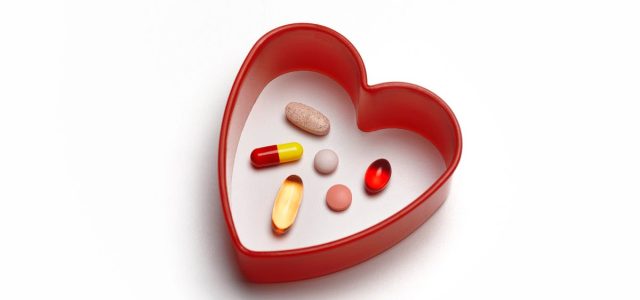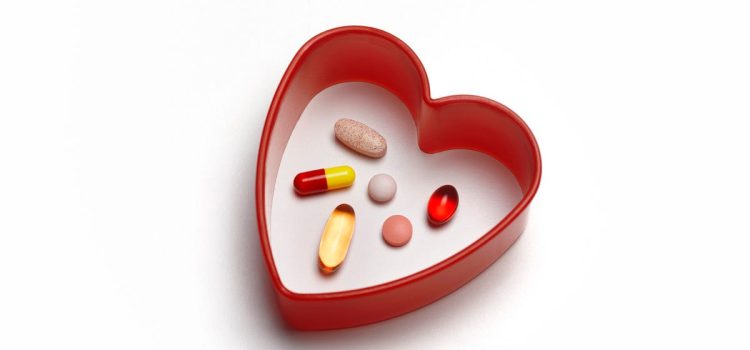


Heart disease remains the leading cause of death for people in the US, with the CDC reporting that one person dies every 34 seconds from cardiovascular disease. The CDC also reports that about 697,000 people in the US died from heart disease in 2020. That comes out to about one out of every five deaths reported that year.
You can decrease your risk of heart disease by eating a healthy diet. The American Heart Association recommends diets that limit excess calories, saturated fat, trans fat, sodium and dietary cholesterol, such as the Mediterranean diet. And if you aren’t getting enough vitamins and minerals from your regular diet, the AHA also says that taking certain supplements can help. While the best way to get those needed vitamins and minerals is from the foods you eat each day, you might be interested in boosting your diet with supplements.
Here are dietary supplements for optimal heart health.
Best heart-healthy supplements

Francesco Carta fotografo/Moment/Getty Images
There are several supplements you can choose if you think your diet doesn’t already contain enough heart-healthy vitamins and minerals.
Omega-3s
Studies have shown that Omega-3 fatty acids can help prevent heart disease and strokes. The National Center for Complementary and Integrative Health states that people who eat diets rich in seafood — a prime source of Omega-3 fats — are less likely to die of heart disease. These studies compared people who ate seafood at least once a week and those who rarely or never ate it.
You can buy supplements that contain Omega-3 fats, such as those containing fish oil or cod liver oil. However, several studies of these supplements couldn’t find conclusive evidence that these products reduced heart disease significantly. The best way to take Omega-3 fats, then, is to obtain it naturally in your diet. Look for fatty fish such as wild salmon, sardines, mussels, rainbow trout and Atlantic mackerel.
If you are taking medicine that affects blood clotting, you should consult with your doctor before taking any Omega-3 supplements.
Fiber
Consuming a diet rich in fiber might help lower your blood cholesterol levels, according to the Mayo Clinic. The Clinic says studies have shown that high-fiber foods might also reduce blood pressure and inflammation, both of which can provide a boost to the health of your heart.
The Clinic also states that those who don’t get enough fiber — particularly soluble fiber — from their diet can benefit from taking fiber supplements such as Metamucil, Konsyl and Citrucel.
While there is no evidence that the daily use of fiber supplements causes any harm, they may cause some side effects such as bloating and gas. The Mayo Clinic also recommends that if you have a history of Crohn’s disease or a bowel blockage in your past, you should talk to your doctor before taking fiber supplements.
Magnesium
If you’re not getting enough magnesium, you might suffer from heart palpitations. That’s because magnesium helps your body maintain a steady heartbeat and lower blood pressure. A lack of this mineral can also cause fatigue, a loss of appetite, muscle spasms, nausea and a general feeling of weakness, according to the Cleveland Clinic.
If you want to boost your magnesium levels naturally, eat whole grains and dark-green, leafy vegetables. You can also get magnesium from low-fat milk, yogurt, soybeans, baked beans, peanuts, almonds and cashews.
You can also obtain your daily magnesium from supplements, though medical professionals recommend eating magnesium-rich foods as a better option. If you have end stage liver or kidney disease, you should be especially careful about consuming too much magnesium, particularly through dietary supplements, because too much of this mineral could prove toxic. It is very rare to consume excess magnesium from food. It is more likely to be from over-supplementation.
Coenzyme Q10
Coenzyme Q10 — or CoQ10 — is an antioxidant that your body produces on its own. However, the levels of CoQ10 that you produce drop as you get older. The Mayo Clinic says that people who suffer heart disease often have lower levels of CoQ10.
You can take dietary supplements, though, to increase your levels of this antioxidant. As the Mayo Clinic says, you can take CoQ10 supplements in the form of capsules, chewable tablets, liquid and powders.
CoQ10 has been shown to improve the conditions that reduce the risk of congestive heart failure, according to the Mayo Clinic. It might also help to lower your blood pressure. It might even help people, when combined with other nutrients, who have had heart valve and bypass surgeries.
The Mayo Clinic says that CoQ10 supplements come with few, and usually mild, symptoms, including loss of appetite, nausea, diarrhea and upper abdominal pain. Avoid taking CoQ10 if you are taking Coumadin (Warfarin).
Folic acid
Folic acid, also known as vitamin B9, can help maintain the right level of homocysteine in your blood, when it is used in conjunction with vitamins B6 and B12. That’s important: High levels of homocysteine — an amino acid — is associated with an increased risk of heart disease. Folic acid supplementation does not decrease the risk of heart disease but helps to provide protection from heart disease such as stroke. The CDC also advises women who might get pregnant to get 400 micrograms of folic acid every day. That’s because this B vitamin helps prevent birth defects.
The Mayo Clinic says that the best source of folic acid is a diet rich in dark-green leafy vegetables, beans, peas and nuts. You’ll get plenty of folic acid in fruits such as oranges, lemons, bananas, melons and strawberries too.
You can also get folic acid in its synthetic form in vitamins and in foods fortified with the vitamin, such as cereals and pastas. The Mayo Clinic recommends folic acid supplements for people who have poor diets or conditions that interfere with their body’s ability to absorb folate.
Folic acid supplements have mild side effects such as nausea, loss of appetite, confusion and irritability. You might also experience sleep interruptions after taking folic acid supplements.
Risks heart health supplements
The most common form of heart healthy supplements, such as folic acid, magnesium and fiber, come with mild side effects. But if you have certain health issues, such as kidney disease, Crohn’s disease or issues with blood clotting, you should discuss supplements with your doctor before taking them.
It’s important to note, too, that the best way to get minerals and vitamins is through a healthy diet. Medical professionals recommend diets high in seafood, leafy green vegetables, beans, fruit and lean meats. If you eat the proper diet, you usually won’t need to take any supplements.
The information contained in this article is for educational and informational purposes only and is not intended as health or medical advice. Always consult a physician or other qualified health provider regarding any questions you may have about a medical condition or health objectives.
